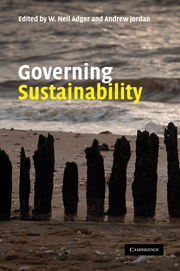Book contents
- Frontmatter
- Contents
- List of figures
- List of tables
- List of contributors
- List of abbreviations
- Foreword by Jonathon Porritt CBE
- Preface
- Part I Overview and Context
- Part II Governance and Government
- 3 Governance, government and the pursuit of sustainability
- 4 How do environmental actors make governance systems more sustainable? The role of politics and ideas in policy change
- 5 Global governance for sustainable capitalism? The political economy of global environmental governance
- Part III Governance and Civil Society
- Part IV Governance and Decision Making
- Part V Conclusions
- Index
- References
4 - How do environmental actors make governance systems more sustainable? The role of politics and ideas in policy change
Published online by Cambridge University Press: 05 June 2012
- Frontmatter
- Contents
- List of figures
- List of tables
- List of contributors
- List of abbreviations
- Foreword by Jonathon Porritt CBE
- Preface
- Part I Overview and Context
- Part II Governance and Government
- 3 Governance, government and the pursuit of sustainability
- 4 How do environmental actors make governance systems more sustainable? The role of politics and ideas in policy change
- 5 Global governance for sustainable capitalism? The political economy of global environmental governance
- Part III Governance and Civil Society
- Part IV Governance and Decision Making
- Part V Conclusions
- Index
- References
Summary
Introduction
Opening up fields of economic management to forms of environmental planning that are publicly accountable is a critical aspect of the transition of society towards sustainable development. But this is not an easy or straightforward task for those seeking to govern society. Indeed it has been at the core of environmental politics since the 1970s. As Carter (2001: 162, 191) remarks, ‘the structural power of producer interests in capitalist society’ means that ‘more often than not, the interests of producer groups trump those of environmental groups, and economic growth takes priority over environmental protection’. In this chapter, we address the question of what viable options are available to environmental groups to fundamentally alter the unequal terms of these encounters in governing systems, and thus make sustainable governance a more realistic possibility.
We do so by examining the repeated efforts of one group – the Campaign to Protect Rural England or CPRE – to penetrate the inner workings of the agriculture policy sector – or community – in the UK. What is unusual about the CPRE is that, as a reasonably well-resourced and well-established environmental group, it has persistently sought to defeat the agriculture policy community since the 1970s. In its own self-estimation, it was ‘one of the first environmental organisations to challenge the assumption that farming was a natural conservator of a beautiful countryside’ (CPRE Policy Committee 23 July 1992 Appendix A, para. 5).
- Type
- Chapter
- Information
- Governing Sustainability , pp. 76 - 98Publisher: Cambridge University PressPrint publication year: 2009
References
- 2
- Cited by



